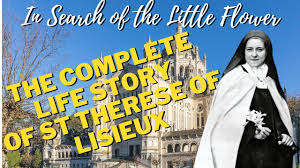Logline:
A young French girl’s extraordinary faith transforms suffering into love, as she becomes one of the most beloved saints of modern times—proving that even the smallest soul can achieve greatness through humility and trust in God.
Act 1: The Little Flower’s Beginnings
In late 19th-century France, Thérèse Martin (played as a child by a tender yet luminous young actress) grows up in a devout, affectionate family. After her mother’s early death, she clings to her father and sisters, developing a deep, childlike love for God. At just 14, she overcomes immense obstacles—including opposition from Church authorities—to enter the Carmelite convent of Lisieux, where her older sister Pauline already resides.
Act 2: The Little Way
Inside the cloistered walls, Thérèse (now portrayed by a gentle but determined young woman) struggles with illness, spiritual dryness, and the petty jealousies of convent life. Yet instead of grand gestures, she embraces “The Little Way”—small, daily acts of love and sacrifice, offered to Jesus. She writes: “Miss no single opportunity of making some small sacrifice… a kind look, a patient smile.”
Her humility is tested when a fellow nun mocks her piety, and when her beloved father suffers a mental breakdown. Yet Thérèse transforms these pains into offerings, calling herself “God’s little plaything.”
Act 3: The Final Offering
As tuberculosis ravages her body, Thérèse endures agonizing pain without complaint, offering it for sinners and priests. In her final months, she whispers to her sisters: “After my death, I will let fall a shower of roses.”
She dies at 24, seemingly forgotten—but her posthumously published memoir, “Story of a Soul,” becomes a global sensation. Miracles attributed to her intercession multiply, leading to her canonization and declaration as a Doctor of the Church—the youngest ever.
The film closes with a montage of ordinary people worldwide finding hope in her “Little Way,” as roses bloom on her grave.
Themes & Style:
- Intimate & Lyrical: Soft lighting, close-ups on Thérèse’s expressive face.
- Key Themes: Redemptive suffering, divine love in smallness, the power of hidden holiness.
- Historical Accuracy: Real quotes from her writings; authentic Carmelite setting.
Why It Resonates:
- Universal Appeal: A story of finding purpose in obscurity.
- Spiritual Depth: Avoids sentimentality, showing her dark nights of faith.
- Visual Poetry: Roses, candlelight, and changing seasons mirror her soul’s journey.
Perfect for: Fans of The Song of Bernadette, Mother Teresa (2003), or Of Gods and Men.
Tagline Ideas:
- “The smallest soul will light the world.”
- “Her battlefield was love. Her weapon, surrender.”

FULL MOVIE👇👇👇👇
👉👉👉👉👉👉🎞🎞https://t.me/phytonrobinson6/5
👉👉👉👉👉👉🎞🎞https://t.me/phytonrobinson6/5


